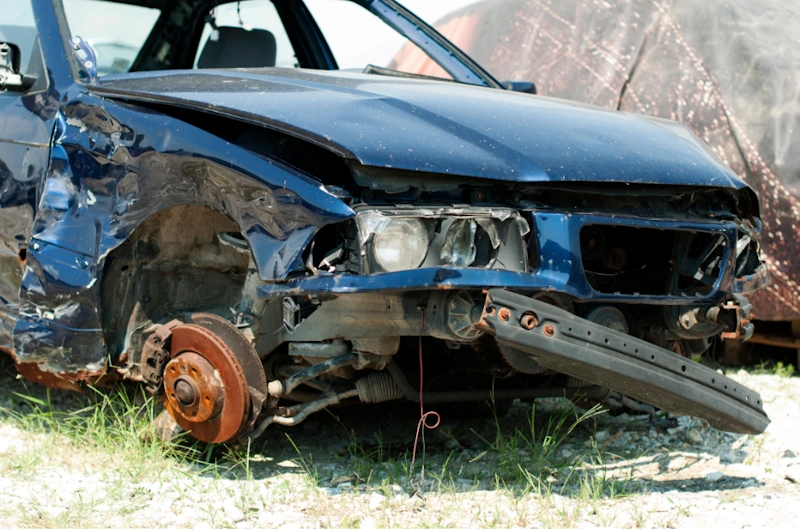Selling cars for scrap? Whether you’re a novice in selling a car for scrap or a seasoned individual aiming to maximize your returns, the following insights are designed to empower you.
Selling cars for scrap? By providing valuable information, these tips will enable you to make informed decisions throughout the selling journey, ensuring that you secure the best possible deal for your vehicle. From understanding market fluctuations to exploring alternative selling options, this comprehensive guide is your key to navigating the scrapping world confidently and efficiently.
1. Junkyards Are Interested in the Scrap Value of Junk Cars
If you’ve ever found yourself contemplating selling cars for scrap, chances are you’ve received a quote that revolves around the scrap value of your vehicle. These offers for selling cars for scrap, commonly provided by junk car buyers or salvage yards, are often determined based on the weight of the scrap metal. In this scenario, it’s important to note that the focus is primarily on the overall scrap value rather than the potential worth of individual components within your car.
Unlike traditional buyers who consider a vehicle’s functional and reusable parts, salvage yards giving offers for selling cars for scrap tend to prioritize the recyclable materials in a junk car. This means that factors such as the condition of the engine, the quality of tires, or the state of the transmission may not significantly impact the offer you receive. Instead, the primary consideration lies in the weight of the vehicle’s metal, making it a straightforward and standardized process.
While this approach simplifies the selling process, car owners must recognize that the offered price may not reflect the potential value that functional components of their vehicle could have. Therefore, if you want to get the most value out of your old car for when selling cars for scrap, exploring alternative options, such as selling to a buyer who values reusable parts, might be worth considering. Understanding the different approaches to valuing junk cars empowers individuals to make informed decisions. It ensures they receive fair compensation for their vehicles, whether based on scrap weight or the potential value of reusable components.
2. Strip Your Car of Components If You Have Time
If you’re considering selling cars for scrap, brace yourself for a hands-on process that involves stripping everything non-metal from the interior. This includes draining or flushing out fluids, detaching wires, extracting the engine and transmission, and even removing the seats. While opting for this DIY approach might potentially yield more profit compared to selling to a junkyard, it undeniably demands significant time and physical effort.
One of the critical challenges is the meticulous removal of various components, ensuring they are in good condition for potential resale. It’s a labor-intensive endeavor that requires both skill and patience. Additionally, unless immediate buyers are lined up for the parts, proper storage becomes crucial to prevent damage or deterioration.
Researching the market value of each extracted part is another essential step in this process. Understanding the worth of the components allows you to gauge a reasonable profit range when you eventually put them up for sale. This research helps you decide which parts are worth selling individually and which might be better suited for scrapping.
While the DIY approach can be more financially rewarding, it’s essential to weigh the potential profit against the considerable time and effort investment. Unless you’re well-versed in car mechanics or have a network of buyers, selling your car as a whole or to a junkyard might still be a more practical and time-efficient solution.
3. Selling to a Junkyard or Salvage Yard is the Fastest Option
If dismantling your disintegrating junk car feels overwhelming due to time constraints, your quickest and most convenient option for selling cars for scrap is to sell it to a junkyard or salvage yard. These establishments specialize in efficiently handling the recycling and disposal of vehicles, offering a streamlined solution for owners looking to rid themselves of non-functional cars. By opting for this route, you can save yourself from the laborious task of stripping down the vehicle, dealing with individual part sales, and researching market values. Selling to a junkyard ensures a prompt removal process, allowing you to free up space swiftly and bid farewell to your old vehicle without requiring extensive time and effort.
4. Your Location Can Impact Offers for Your Junk Car
Much like the fluctuating value of other commodities, the price of scrap metal experiences monthly and yearly variations. Adding to this complexity, salvage and junk yards nationwide exhibit distinct preferences regarding the types of vehicles they seek to acquire. Some may be interested solely in the scrap value, aiming to recycle the metal efficiently. In contrast, others might look for vehicles with salvageable parts for refurbishment or resale and restoration purposes.
Another consideration influencing the price you receive for your vehicle is the distance the towing service must cover to collect it. Salvage yards often offer higher payouts when the owner can drive the vehicle directly to their facilities, saving them the effort and cost of towing. Understanding these factors can empower car owners to make informed decisions about where and when to sell their vehicles, maximizing their returns while accommodating the specific requirements of salvage yards in their region.
5. Learn to Differentiate the Scrap Value of a Car and The Value of Individual Components
One everyday misconception individuals often fall prey to when attempting to selling cars for scrap is assuming that a smoothly running car, regardless of age or other factors, will fetch a higher payout.
It’s crucial to understand that merely possessing a late-model vehicle with low mileage, a clean title, and an unblemished body doesn’t necessarily translate to a substantial cash offer when trying to get an offer after selling cars for scrap. These companies typically specialize in scrapping and recycling materials rather than buying and reselling used cars.
While you might view your car as junk, it’s essential to acknowledge that the definition of “junk” varies among individuals. To junkyards, it typically refers to end-of-life vehicles with more value as scrap metal than individual parts. Conversely, your perception of a junk car might stem from handling issues or being a gas guzzler. A mechanic or junkyard attendant might see what you consider valuable as a rust bucket with minimal parts value. Recognizing these differing perspectives is crucial when navigating the sale of your vehicle, ensuring realistic expectations and informed decisions throughout the process.
The Takeaway: There’s An Easy Solution for Selling Cars for Scrap
If you’re ready for selling cars for scrap, a simple solution awaits –give Junk Car Dog a call! By contacting our friendly team, you can swiftly receive a top cash offer for your junk car.
We prioritize a hassle-free experience, sparing you from the complexities of selling old vehicles. Our streamlined approach ensures a straightforward and convenient transaction, allowing you to transform your junk car into instant cash quickly. So, why navigate the complexities when you can simplify the process? Dial-up Junk Car Dog and let us take care of the rest – turning your unwanted vehicle into quick cash has never been so effortless!

